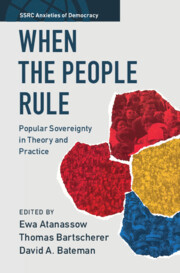Book contents
Select Bibliography
Published online by Cambridge University Press: 23 November 2023
- Type
- Chapter
- Information
- When the People RulePopular Sovereignty in Theory and Practice, pp. 335 - 370Publisher: Cambridge University PressPrint publication year: 2023
- Creative Commons
- This content is Open Access and distributed under the terms of the Creative Commons Attribution licence CC-BY-NC 4.0 https://creativecommons.org/cclicenses/

